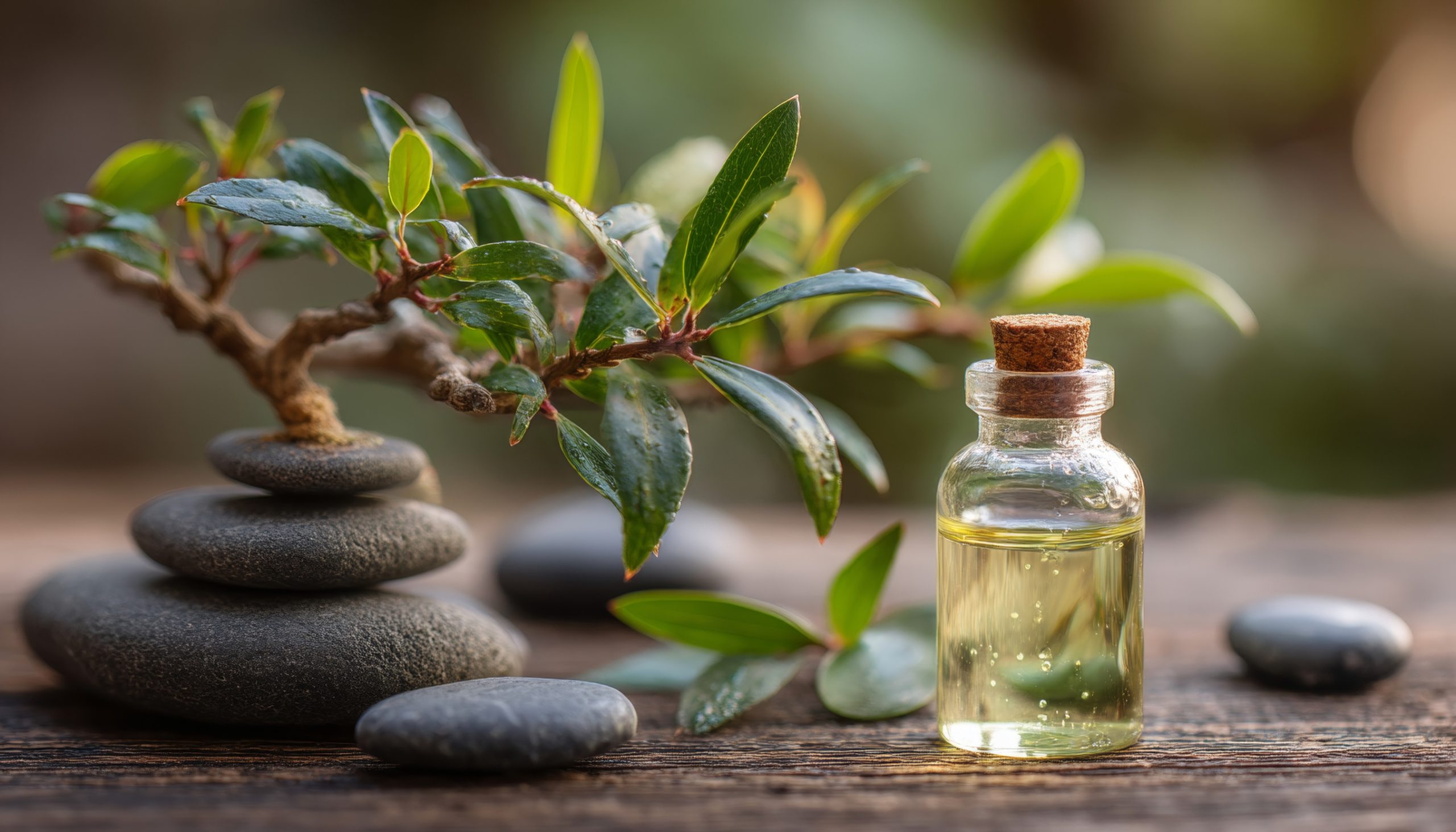BY THE OPTIMIST DAILY EDITORIAL TEAM
Essential oil aficionados have long touted the many benefits of tea tree oil. On top of giving off a clean and calming scent for your home, tea tree oil can be a wonderful treatment for your skin and hair. Here are some things you should know about tea tree oil before integrating it into your self-care routine.
What is tea tree oil?
Tea tree oil is the essential oil extract from the leaves of the Melaleuca alternifolia tree that is native to Australia. “It’s a colorless to pale yellow, clear, mobile liquid with a distinctive aromatic, earthy, pine odor,” explains Julio Pina, the director of R&D Innovation at Innovation Labs (iLABS).
You can find tea tree oil in a number of personal care products including cosmetics, moisturizers, and soaps.
What is tea tree oil good for?
While many people may be skeptical about the usefulness of essential oils, tea tree oil is one that has been used and studied for decades, so there is a significant body of research that can confidently back up its benefits.
Tea tree oil can help fight acne
The next time you find a new pimple on your face, instead of reaching for a drugstore acne fighter, consider switching it out for some all-natural tea tree oil.
Tea tree oil has antiseptic properties that make it an effective way to combat breakouts and, more specifically, the acne-related bacteria Propionibacterium. One study actually investigated how tea tree oil and benzoyl peroxide compare in their ability to treat acne and discovered that tea tree oil reduces the inflammation of lesions with less irritation. Pina also says that tea tree oil may promote clearer, smoother skin by preventing and reducing acne scars.
It can kill bacteria
The next time you’re browsing through cleaning solutions at your local grocery store, you may notice that tea tree oil is an ingredient in at least a few cleaners. You might also catch a glimpse of it in the medicine aisle as part of a cough or cold remedy. This is because tea tree oil has been scientifically proven to kill bacteria, viruses, and fungi, says Renée Moran, DO, owner of Dr. Renée Moran Medical Aesthetics & RM Skincare. “Because of its properties—antibacterial, anti-inflammatory, antifungal, and antiviral—it’s used universally,” she adds.
It’s multi-purpose in the home
We mentioned the refreshing scent of tea tree oil before, but we’ll dive deeper into it here because it may just be the home fragrance you’ve been looking for. Its natural musky scent has soothing properties while naturally cleansing the air in your living space. Fragrance expert Kelly Kussman describes the aroma of tea tree oil as fresh, timeless, delicate, and powerful. It can also help repel mosquitos and rid your textiles of funky odors.
It’s a soothing nail treatment
This is especially pertinent for people who put stress on their nails by frequently getting manicures and pedicures. According to Natalie Aguilar, aesthetician and dermatological nurse, tea tree oil is a fantastic healing treatment that can be used to treat or prevent fungus.
Once you’ve scrubbed old nail polish off your nails with acetone, she recommends rubbing tea tree oil on your bare nails before allowing them to breathe for a couple of days before applying new polish. “It also feels nice to massage residual oil with a foot moisturizer after a long day,” she adds. “Wiping your bare toenails with tea tree oil can help prevent the yellowing that occurs with constant polishing.”
It can help treat dandruff
It’s difficult for experts to determine the one root cause of dandruff, however, it’s generally linked to the presence of microorganisms such as bacteria, fungus, and yeast, that live on the scalp.
As we mentioned before, tea tree oil’s antibacterial and antifungal properties make it ideal for getting rid of dandruff. A study published in the Journal of the American Academy of Dermatology revealed that using shampoo with five percent tea tree oil reduced dandruff in one group by 41 percent compared to the placebo group.
What to know before using tea tree oil
While the benefits of tea tree oil ring true, you should be careful to never ingest it and to avoid direct contact with your eyes. Most medical professionals will say that ingesting essential oils is a dangerous practice. You should also check to see if a tea tree oil product has gone through the Human Repeat Insult Patch Test (HRIPT), a clinical study performed on humans to determine if a product leads to irritation.
You should also test out a small amount on your skin or hair, especially if you know you have sensitive skin. Another option is to dilute the formula in a compatible substance such as caprylic/caprice triglyceride, castor oil, or coconut oil.
Lastly, remember to store tea tree oil in an amber glass bottle at room temperature because the essential oil is quite sensitive to air, light, and heat. “To be cautious and prolong the shelf life of your solution, including an antioxidant such as vitamin E, is recommended,” says Pina. “Vitamin E will synergistically improve the benefit of tea tree oil while serving as a natural antioxidant and soothing agent.”










